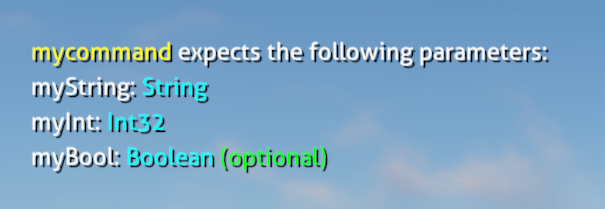Adding Custom Console Commands
Nautilus provides a simple API for allowing you to define custom console commands for your mod to respond to when the user types them into the in-game dev console, with simple parameter type checking to enable user- and developer-friendly error reporting, both on-screen and in the log.

Supported Parameter Types
Currently, only the following types are supported by the API:
stringboolintfloatdouble
If you wish to use a type not in this list, it is recommended to use string (as that is what the value coming from the user will be anyway) and handle converting and error-checking the value for yourself.
If the user provides incorrect parameters for a command, they will be notified of the expected parameters on-screen and in the log file.
Registering a Custom Console Command
There are three ways to register custom console commands, so you can use whichever suits your purpose or coding-style best.
Warning
Registered commands must be unique. If any mod has already added the command, your command will be rejected.
Note
A command can have a return type, but it is not necessary. If it does return any type, it will be printed on-screen and in the log file.
Registering a delegate (Callback) as a Command
By calling ConsoleCommandsHandler.RegisterConsoleCommand<T>(string command, T callback), you can pass an instance of the delegate, whether it is an anonymous lambda or reference to a method that implements the delegate signature to register your callback as a response to the command.
Note that with a delegate command, it is not possible to use optional parameters.
If you want optional parameters, it is recommended to register a public static method as a command instead.
In the example below, we are registering a console command by the use of a delegate. The delegate will respond to the "delegatecommand" command from the dev console in the game.
You can also use System.Func or System.Action delegates to define the signature for your command signature.
using BepInEx;
using Nautilus.Handlers;
[BepInPlugin(PluginInfo.GUID, PluginInfo.MOD_NAME, PluginInfo.VERSION)]
public class MyPlugin : BaseUnityPlugin
{
private void Start()
{
ConsoleCommandsHandler.RegisterConsoleCommand<MyCommand>("delegatecommand", (myString, myInt, myBool) =>
{
return $"Parameters: {myString} {myInt} {myBool}";
});
}
private delegate string MyCommand(string myString, int myInt, bool myBool);
}
The command: delegatecommand foo 3 true is a valid signature for the code above.
Registering a public static Method as a Command
By calling ConsoleCommandsHandler.RegisterConsoleCommand(string command, Type declaringType, string methodName, Type[] parameters = null), you can specify a public static method as a response to the command. The API here is similar to Harmony in that it will search for the method in the given type, using the optional Type[] parameters to target overloads.
In the example below, we are registering a console command by specifying a target method. The method will respond to the "methodcommand" command from the dev console in the game.
using BepInEx;
using Nautilus.Handlers;
[BepInPlugin(PluginInfo.GUID, PluginInfo.MOD_NAME, PluginInfo.VERSION)]
public class MyPlugin : BaseUnityPlugin
{
private void Start()
{
ConsoleCommandsHandler.RegisterConsoleCommand("methodcommand", typeof(MyMod), nameof(MyCommand));
Logger.LogInfo("Patched successfully!");
}
public static string MyCommand(string myString, int myInt, bool myBool = false)
{
return $"Parameters: {myString} {myInt} {myBool}";
}
}
The command: methodcommand foo 3 true is a valid signature for the code above.
Registering Multiple public static Methods Within a Class as Commands
By calling ConsoleCommandsHandler.RegisterConsoleCommands(Type type), you can register all public static methods decorated with the ConsoleCommandAttribute as console commands.
In the example below, we are registering all console commands specified in the MyConsoleCommands types as console commands.
Methods decorated with the ConsoleCommandAttribute will respond to the specified command from the dev console in the game.
using BepInEx;
using Nautilus.Commands;
using Nautilus.Handlers;
[BepInPlugin(PluginInfo.GUID, PluginInfo.MOD_NAME, PluginInfo.VERSION)]
public class MyPlugin : BaseUnityPlugin
{
private void Start()
{
ConsoleCommandsHandler.RegisterConsoleCommands(typeof(MyConsoleCommands));
Logger.Log(Logger.Level.Info, "Patched successfully!");
}
}
public static class MyConsoleCommands
{
/// The MyAttributedCommand method will respond to the "attributedcommand" command from the dev console.
[ConsoleCommand("attributedcommand")]
public static string MyAttributedCommand(string myString, int myInt, bool myBool = false)
{
return $"Parameters: {myString} {myInt} {myBool}";
}
}
The commands:
attributedcommand foo 3 trueattributedcommand foo 3are both valid signatures for the code above.
Note
Optional arguments can be ignored when executing a command in the dev console. When ignored, the specified default value will be used instead.